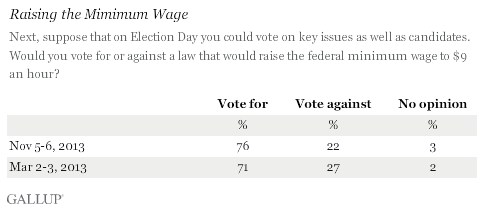Of puppets and strings and doing the right thing
This morning Democratic candidate for governor Mark Schauer called for increasing the minimum wage in Michigan to $9/hour. It’s not just the right thing to do, it’s wildly popular. A Gallup poll released last week shows that a full 76% of Americans support this move, up 5 points from just last spring:
With momentum building at the federal and state level to increase hourly base pay, more than three-quarters of Americans (76%) say they would vote for raising the minimum wage to $9 per hour (it is currently $7.25) in a hypothetical national referendum, a five-percentage-point increase since March. About one-fifth (22%) would vote against this.

It’s so popular, in fact, that even 58% of Republicans support it.
Schauer’s plan would phase in the increase over three years. It would rise from the current level of $7.40/hour (above the national minimum wage of $7.25) to $8.00/hour the first year, to $8.60/hour in the second year and to $9.25/hour the third year. After that, it would be tied to inflation so that people earning the bare minimum would at least be able to keep up with rising costs.
As Schauer pointed out in his press conference in Detroit this morning, it’s also a smart economic move for our state as well as being a moral imperative:
This is about simple economics. When working families have more to spend on everyday necessities like gas, groceries and clothes for the kids, it creates demand for the economy. When demand increases, small businesses grow and hire work more workers. It is also morally the right thing to do for our families.
He also pointed out the fact that, if you work full time, 40 hours per week, 52 weeks a year making minimum wage, you are below the poverty line for a family of two.

Rick Snyder’s response? “That would be a challenge.”
He’s right. His corporate allies and funders, people like the billionaires in the DeVos family and groups like the Mackinac Center will NEVER allow this. A couple of years ago at a Mackinac Center fundraiser, Governor Snyder referred to their “101 Recommendations to Revitalize Michigan” (pdf) and told the crowd he has this list “on his desk and refers to it often”.
Here’s number 41 on the list:
Repeal the “minimum wage” law, which makes it illegal to pay a person less than $7.40 per hour, regardless of voluntary agreements between an employer and employee.
(I’ve summarized some of the other outrageous items on that list HERE.)
As a Michigan League for Public Policy report released last month shows, despite anti-worker rhetoric coming from the likes of our billionaire Republicans and their corporatist propaganda outfits like the Mackinac Center saying this would mainly help kids, 85% of the people who earn the minimum wage are over 20 and 82% work in more-than-half-time (20 hours/week) jobs, 44% of them work full-time.
Dr. Dale Belman, a professor of labor economics at Michigan State University, refutes the Big Business propagated myth that raising the minimum wage will hurt job growth. “It raises wages among the lower 10 percent of male employees and the lower 30 percent of female employees,” he said. “Moreover it will raise incomes with little to no negative effect on employment.”
So, in Michigan, we will have a choice next year. On one hand, we’ll have Rick Snyder who will work his tail off to keep labor costs low to benefit his corporatist pals. Snyder knows that he will never be allowed to support raising the minimum wage and that the Republicans in our state legislature would use any legislation to do so to wipe their feet on. If it doesn’t have a direct, positive impact on corporate bottom lines, it’s “not on their agenda”.
On the other hand, we’ll have Mark Schauer with a vision for Michigan’s resurgent future that includes making sure that those who make the least while trying to raise families, keep food on the table, and a roof over their heads can at least earn a living wage. Every penny these people earn goes right back into our state’s economy which benefits everyone, including the businesses that want to keep wages depressed.
In my book, it’s an easy choice.



